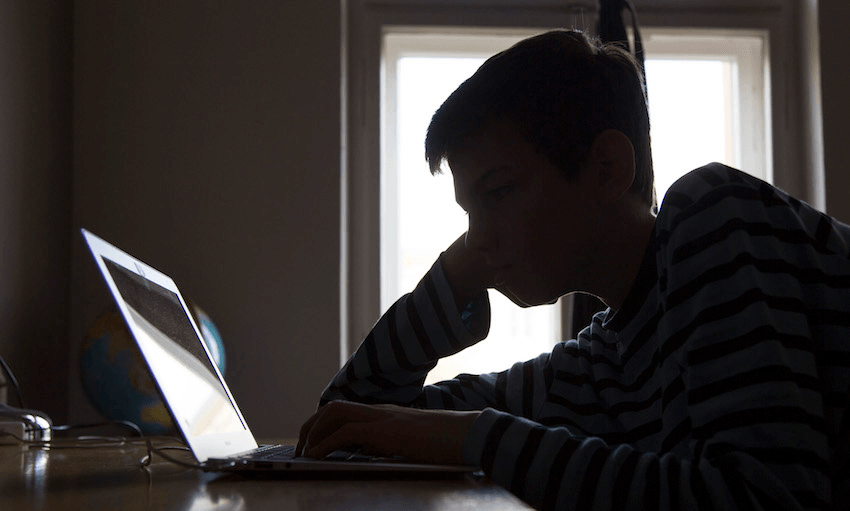What’s the issue with online porn, and is there really any way to keep kids from watching it?
Porn you say? On a Sunday?
Lord forgive us our sins as we forgive those who sin against us, but we need to talk about smut. Specifically, smut on the internet. The government is considering a number of ways to make online porn more difficult for children to access, with internal affairs minister Tracey Martin arguing that an “avalanche of pornography” on the internet is posing a risk to the nation’s children. A ‘porn working party’ including the Office of Film and Literature Classification (OFLC), Netsafe, and the health and education ministries has been set up to investigate the issue and report back.
What’s being considered?
One option, the most extreme, is a New Zealand-wide R18 porn filter, which would require everyone to provide age ID before being allowed to, er, use porn websites. Another possibility is new legislation to ensure parents are educated on the “harms of pornographic material”. Martin says she’s not ruling any option out.
So what’s inspired this sudden interest in porn?
In fact it’s not sudden at all – Martin says the issue has been front of mind for a while, but the March 15 attacks delayed plans to update the law. The inspiration for the porn filter idea clearly comes from the UK, where world-first rules requiring porn sites to verify users’ age were due to become law in July, but were delayed for six months due to an “administrative oversight” (to be fair, lawmakers are a little bit frazzled right now). Under the UK plans, websites that fail to implement the rules could have payment services withdrawn or be blocked entirely for UK users. The rules have come under fire from privacy watchdogs, who warn that having porn searches linked to proof of identity will be a “privacy timebomb” for hundreds of thousands of users.
OK, but why the concern here, and why now?
There’s little doubt that it’s easier than ever for teens to watch porn on the internet. An OFLC study at the end of last year found that two thirds of the New Zealand 14-17 year olds surveyed had seen pornography, and most of them had seen examples of sexual coercion and violence. Meanwhile, the NZ Herald reported that schools blocked 300,000 porn searches in March 2019 alone, and it’s doubtful they were all maths teachers doing some browsing on their tea break.
So all that porn is a problem?
“Pornography can negatively impact a young person’s mental health and wellbeing and their knowledge, attitudes, beliefs and expectations about sex and gender,” says Netsafe. “Exposure to pornography has also been found to shape sexual practices and strengthen positive attitudes toward sexual violence and aggression.”
Does everyone agree that’s true?
Not at all. There are a lot of reasons to wonder if the moral panic isn’t just a bit exaggerated, and the causal link between porn viewing and negative attitudes to sex and gender overstated. A 2005 study found that young people who seek out pornography are significantly more likely to also report “delinquent behavior”, substance use, and depression than those who do not, suggesting the issue is a little more complicated than ‘porn: bad’.
And while young people’s exposure to coercive and violent sexual material is worrying, it’s an open question how often this extreme content is actually being sought out, and how often it is accidentally seen during other porn searches. Either way, blocking underage access to all porn seems something of an overreaction to concerns about a small – but troubling – subset of pornographic content.
Even more pertinent is the fact that age restrictions probably won’t work. As Kris Taylor, an academic studying young people and porn use, pointed out on The Spinoff last year, blocking Pornhub doesn’t solve the issue of porn posted on ostensibly non-pornographic message boards like Reddit, or the preponderance of pornographic content accessible via Twitter – neither of which would be covered by an age verification system.
Aren’t there ways to stop children accessing porn already?
Indeed there are: If you’re a parent who doesn’t use parental control tools, it’s probably time to educate yourself on how to set them up. It takes less than 10 minutes and a hard restart to block access to porn websites like Pornhub and – if you want – to be notified when your kids search for inappropriate content (an opportunity to talk to them about online porn, a good idea anyway). Make setting up controls your Sunday project – it’s a rare opportunity to wield your parental power knowing that you’re unlikely to hear a single word of complaint.
